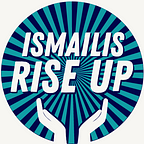Movement Building: Keeping the Post-2020-Election Momentum Alive
Ismailis Rise Up launched in July 2020 to activate and build the political power of the U.S.-based Ismaili Community. Building on our 2020 work to register and turnout a historic number of first-time Ismaili voters, and our 2021 work to call almost every Ismaili voter to participate in the Georgia runoff election, we came together in March of 2021 to reflect on what our community has collectively accomplished and where we go from here.
On March 18, IRU Field Director Fahim Gulamali spoke with voting rights attorneys and advocates, Poy Winichakul of the Southern Poverty Law Center, Shannon Talbert of Color of Change, Mrinalini Chakrobarty of the Women’s March, and Scott Simpson of Muslim Advocates about how organizations, like IRU, can build and sustain a grassroots movement to advance our community’s political power.
Here’s a breakdown of the discussion:
What can organizations and individuals do to support the AAPI community during this time?
Centering the affected community is key. It is crucial to let the community speak as we listen and amplify their voices. As allies, it is our responsibility to step up and ask what we can do to support. Use the pain and empathy you feel for others as leverage towards social change. Bring any experience you have to the table to support and validate the leaders of the community.
Remember that instances of AAPI violence are not isolated. We must acknowledge the historical context that leads to events like the Atlanta massacre. This can make us uncomfortable, but it is important for allies and members of the community alike to sit with that discomfort. Unpack what causes it and use that to continue learning.
Most importantly for allies (which includes YOU): Show up even when it’s not convenient. Show up even when the noise dies down.
Create movements that give people the resources they need so they can continue showing up. Provide them with the resources to sustain the movement; so that they can respond and take action every single time with the greatest force.
How can organizations, like IRU, build a movement and sustain it?
Organizations need to build real relationships with the people they are organizing. Don’t just stick to the surface of what is known about the community. Dig deep. An organization should fully examine and understand the diversity that lives within the target group.
Groups, like IRU, should get to know the people who want to be a part of their movement. Listen to their stories. Share their stories. Essentially, know the audience.
In addition to knowing the audience, acknowledge that all of our struggles are interconnected. Political action does not occur in silos. Audre Lorde, who described herself as “Black, lesbian, mother, warrior, poet”, says “there is no such thing as a single-issue struggle, as we do not live single-issue lives.”
And again, as an organization, it is crucial to have the resources ready so that everyone is prepared to respond. Without resources in place, sustaining a movement is nearly impossible.
Another fundamental tactic to sustain movements is to center the movement around joy. The issues we stand and fight against are the causes of multiple levels of pain for the community we are trying to rally. Centering the movement around the people we are trying to organize, their culture, their happiness, is what will bring people together. This might be difficult if the people are from different backgrounds, but it is important to acknowledge and find shared ideologies amongst the community to focus on. Our similarities and our joy will bring us together.
Above all, we must stick together and hold our own accountable. The opposition will always find ways to create divide. Solidarity is our greatest asset!
How can organizations build a movement that supports more than one issue?
Building a movement is not possible without acknowledging the intersectionality of people and the issues they face. As we build relationships with and learn about the people we organize, we must dig deep and learn about their whole identity. The deeper we dig the more the intersections become apparent and the more the community’s diversity is revealed.
Use the connections we have and reach out to other movements covering different issue areas. Invest in political education and leadership development. Work together and learn from those outside of our own organization, community, and identity. There is an interdependence when it comes to the matters we advocate for. As Poy Winichakul said during the discussion, “we rise and fall together.”
Everything we aim to fight for is related to something else. Women’s rights intersects with racial justice. Climate change intersects with disability rights. When we’re paving the path for one issue, we must remember to create room for the ones that will inevitably follow.
All of our struggles are related. We are in this together.
Three tips for individual organizers just starting out:
- Find someone whose work you admire and build a relationship. Shoot your shot!
- Ask questions. Stay curious.
- You don’t have to stick to one issue. Try everything and find what motivates you.
Recommended readings/things to watch for continued learning:
- Servants of Allah by Sylviane A. Diouf
- We Have Always Been Here: A Queer Muslim Memoir by Samra Habib
- The Combahee River Collective Statement
- American Revolutionary: The Evolution Of Grace Lee Boggs
- We Do This ’Til We Free Us: Abolitionist Organizing and Transforming Justice by Mariame Kaba
- Audre Lorde’s work
- Ibram X. Kendi’s work
